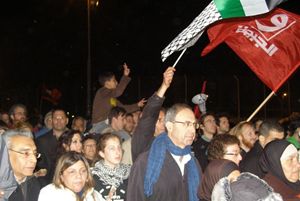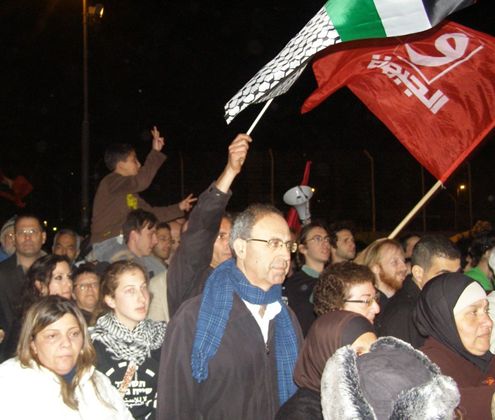
Second on the list of Hadash, an Arab-Jewish socialist front which currently has four seats in parliament, MK Hanna Swaid is one of the most erudite and effective lawmakers in the Knesset. A civil engineer with a PhD from the Technion in Haifa, he speaks quietly and eschews political theater in favor of a focus on the kind of parliamentary minutiae that improve the lives of his voters — things like overlooked clauses in land reform bills. He attends protests that are usually not covered by TV cameras and does not give fiery quotes to reporters. An advocate for the idea that Arabs and Jews can live together in Israel, he has received little public notice in a political system increasingly dominated by extreme right and racist voices.
Swaid was born in 1955 in Eilaboun, seven years later after his family’s exodus during the Nakba and return in 1948. He grew up with the events of that war hovering over the village, just as violence and loss haunted the rest of the Arab and Jewish citizens of the new country in which the village found itself. “I know that every kid in Eilaboun knows exactly what happened in 1948,” Swaid said in an interview for “Times of Israel” website. At the end of October, 1948, Israeli troops captured the village of Eilaboun and its 800 Christian residents. The soldiers were taking part in Operation Hiram, in which the recently created Israeli military conquered a swath of Galilee as it struggled to repel five Arab armies.

“The Israeli right,” said MK Swaid (in blue scarf), is “waiting for us in the corner, to catch anything we might do in order to use it and exploit it against us” (Photo: Hadash)
The troops, from the Golani Brigade, selected 12 young men from Eilaboun and shot them. Then they rounded up the rest of the villagers and expelled them northward toward Lebanon. “But I also know that the message of the parents of Eilaboun to their children, along with telling them the story, is to reconcile, to look for a good life and peace and not to dwell in hatred. That’s how I was raised.”
The rising forces in the Israeli political system, Swaid said, pose threats to the very elements of democratic life, like “Otzma Leyisrael,” (“Strength for Israel”)’ populated by extremist settlers and Kahanist acolytes among them the current MK Michael Ben-Ari. Being targeted by the right is actually a boon for an Arab politician, he said: “If an extremist Jewish party asks to disqualify me, this does wonders for my support. So all Arab parties like to be targeted, because they know they will eventually go to the High Court and will be able to run, and then they can go to their voters and say, ‘We won the fight against this Zionist intrigue.'”
Because Hadash sees one of its key roles as safeguarding the place of Arabs in Israel’s democracy, Swaid said, it steers clear: “We as a responsible party cannot be part of this game. I believe that what happened in Israeli politics is a kind of transformation — the extreme right became the mainstream, and the most extreme people are sitting at the center of Israeli politics,” he said. “We are very concerned about the results of this election. We are concerned about a majority consisting of the right-wing bloc enacting legislation directed against the Arab population,” he added. That’s why his front’s activists are working day and night to get their people to vote, hoping to reverse a trend that has seen Arab participation in elections drop to around 50 percent. The right wing rising forces in the Israeli political system, he said, pose “threats to the very elements of democratic life.”
“Hadash,” a Hebrew word meaning “new,” is an acronym for the Democratic Front for Peace and Equality – Communist Party of Israel. In Arabic it is generally known as al-Jabha, or “the Front.” Founded in the 1970s by non-Zionist left of the Israeli political system, the front is unique for its emphasis on Jewish-Arab cooperation. Party leaders were among the first to promote a two-state solution on the 1967 lines, long before the Oslo Accords of the 1990s made that idea mainstream. The core ideology of Hadash, Swaid said, is the “Jewish-Arab struggle for peace and equality.” “We address inequalities, the unjust distribution of wealth among rich and poor. This is what makes Hadash a comprehensive, inter-ethnic party,” he said.
MK Swaid began his political career in 1993 as mayor of Eilaboun, a post he held for 10 years. At the same time, he founded the Arab Center for Alternative Planning, which targeted the planning practices that conceal some of the less obvious gaps afflicting the Arab minority. Only 2.4 percent of the country’s industrial zones are attached to Arab towns, for example, though Arabs make up 20 percent of the population, a lack that affects employment and the tax base of the often insolvent Arab municipalities.
His planning background has served him well in Knesset. Swaid played an important role in blocking the government’s land reform bill in 2009, which drew fierce opposition across the political spectrum as an attempt to allow the privatization of a public resource. When the government sponsored another bill meant to streamline approval for construction, Swaid noticed that the way the bill was phrased would have meant no Arab town would have been able to take advantage of it. He addressed Prime Minister Benjamin Netanyahu in the Knesset, and the prime minister had the bill amended.
Swaid does find reason for optimism in the power of everyday life to force people to get along — a view more easily comprehensible from his vantage point in Galilee, where Jews and Arabs have hammered out a kind of imperfect but genuine coexistence, than from the politically charged precincts of Jerusalem or from parts of the country where Jews and Arabs don’t mix at all. He pointed to Upper Nazareth, a Jewish town built in the 1950s to dominate old Arab Nazareth as part of an effort to strengthen Jewish sovereignty over the still heavily Arab north. Over the years, more and more Arabs from Nazareth have been moving in, turning Upper Nazareth into an ethnically mixed town and turning the plans of its founders upside down. “I’m counting on the kind of coexistence that comes with time,” Swaid said. He described visiting old Nazareth on a recent Saturday and seeing the Arab markets full of Jewish shoppers and visitors. “You see this and you feel — this is the true life,” he said.


